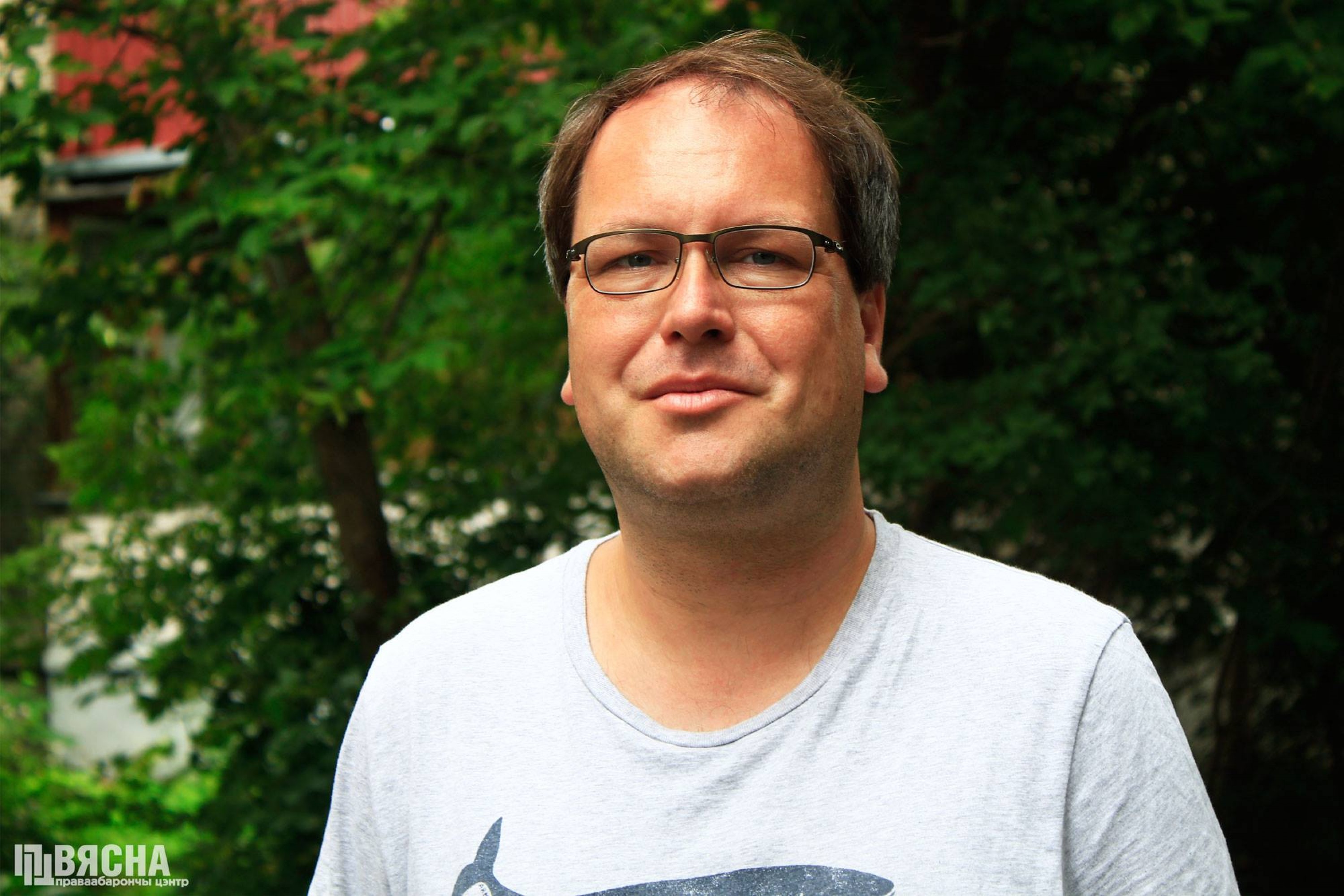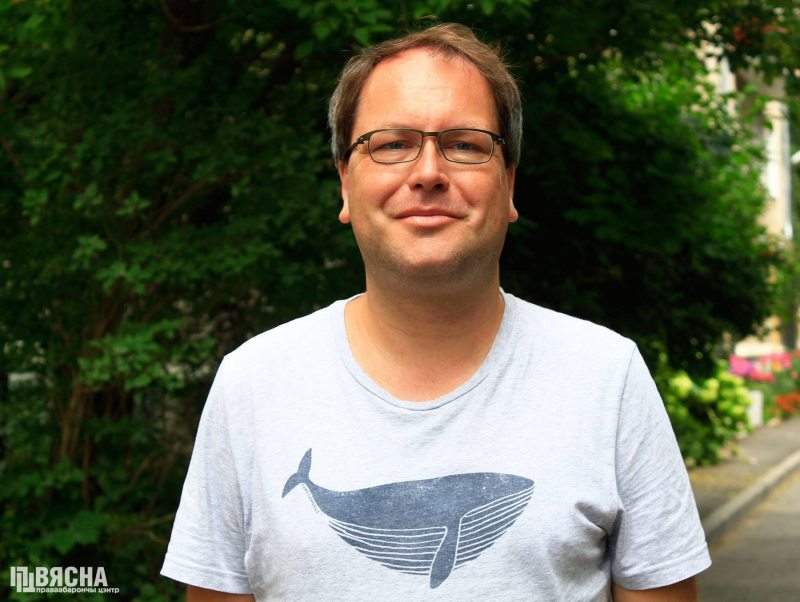Lars Bünger: I really hope changes can happen soon in Belarus
Viasna has talked to Lars Bünger, Chairman of Libereco – Partnership for Human Rights, one of our long-standing partners working on a number of crucial human rights issues in Belarus.
- Do you in Libereco see any positive trends in the sphere of human rights in Belarus?
Of course, the general situation in Belarus is not changing very much. I was here for the first time 18 years ago. And Lukashenka has been in power now for 24 years. And the general circumstances of the political situation does not change very much. It’s a dictatorship, there’s one ruler, and he will not admit that someone will try to overcome his rule. This is a general perspective and that is quite sad. I know a lot of people who used to live in Belarus 10 or 12 years ago. They were quite active, they participated in demonstrations and so on. And some were in prison or became victims of torture in prison, so that some of them left the country. And I understand that some friends of mine who are of my age have left the country because they don’t see any perspectives to get a good job. It makes me sad in a way. But I notice that there are still people who try to change something. Of course, I can notice some changes after coming to Belarus for 18 years, like bigger supermarkets, big shopping malls, new restaurants and cafes, bikers in the streets of Minsk, modern buses, more Western lifestyle with smartphones and all that stuff that we have in Germany, too. So, of course, the general circumstances are more modern, but the political situation and the human rights situation it’s at the same bad level as always. For some years now we only notice a few political prisoners who are imprisoned for long terms, but this could change tomorrow. It could be at any point that a big demonstration takes place for some reason and then the police uses violence against peaceful demonstrators and people could be sentenced to long prison terms - as soon as the government gets a feeling that it could be dangerous for them.
If you compare it with Russia, Donbas, Syria or Turkey, the situation is of course much better in Belarus at the moment. But we all know - and people who really followed the development of Belarus for the last 20 years should know - that Lukashenka will not change and that any changes towards a democracy with Lukashenka are impossible. And as long as he is in power he will avoid real democratic reforms. And if people try to change that, it’s quite possible that they will go to prison again.
But I am happy that now there are only two political prisoners [Mikhail Zhamchuzhny and Dzmitry Paliyenka - Ed.], and one of them [Dzmitry Paliyenka - Ed.] will be released this autumn. Because I remember that after the elections of 2010 we had a list of up to 50 people who got prison terms. And compared to that it is now much better.
- What issues, besides the rights of homeless people, does Libereco work on in Belarus or want to work on in the future?
The topic of homeless people is a brand new one. And we haven’t really started to work on it yet. Some years ago in 2013, there was the case of Aliaksei, a Catholic priest, who was charged under Article 193.1 and there was a danger that he might go to prison and that his homeless shelter could be closed. So we were engaged for him. And finally, it was a little success, because the charges against him were dropped. So it was the first time that we noticed this problem, that people who are active, who are engaged and try to help homeless people, they can also face some repression, like the activists of Food Not Bombs for instance. So we had a feeling that it was a good idea to work on this topic. And then during the 2014 Ice Hockey World Championship, we heard reports of homeless people being taken from the streets and dropped out of the city. So now we want to learn more about the situation of homeless people in Belarus.
Other topics that we’ve been working on in Belarus are of course the freedoms of association, expression and assembly. We started the God Parenthood campaign to find members of the European Parliament, of German Bundestag who could take over a godparenthood of political prisoners in Belarus, because there were so many of them. And we managed to find nearly twenty MPs.
We are very much interested in the human rights situation in Belarus. And if there’s a need to take an action, publish a statement or start a petition, we are always up to it. For example, when Ales Bialiatski was in prison, we started a Facebook campaign We Are All Ales in support of him. We also started an email campaign in support of one of the two political prisoners in Belarus, Mikhail Zhamchuzhny.
We are not a very big organization. Altogether, we have around 40 members. Some of us are working on Ukraine and some on Belarus. One of the things that we have done during the past few years was working during elections, it was the Belarus Votes project when we brought a group of journalists from Lithuania, Poland and Belarus to report on the elections. The next elections will take place in 2020, and it could be a good reason to make another round of this project.
We also noticed that there’s been some repression against the Belarusian LGBT community recently. And it could also be another topic for us. The problem was not so visible before, but during the past few months, it has become more public in the media.
- What changes could make you stop working on Belarus?
If elections could take place that are fair, free and democratic. And people are not afraid to speak out freely anymore. And there are no more peaceful protesters who are detained. And of course there should be no more torture and the death penalty should be abolished. If all these human rights are respected in Belarus, then maybe we should focus on other countries. I really hope that one day I can just come here to meet with my friends or for holidays, instead of hearing these sad stories about human rights violations. I dream of it. And I’ve been dreaming about it for 18 years now. But I really hope it can happen soon.
Libereco – Partnership for Human Rights was founded in 2009. It has been working in Belarus and Ukraine aiming to improve respect for fundamental human rights, including freedom of expression, assembly, association, press, conscience and religion. Libereco's most significant efforts include numerous statements, petitions and several major campaigns aimed at attracting foreign attention to Belarus and Ukraine.



















